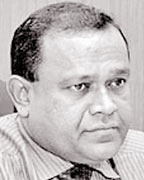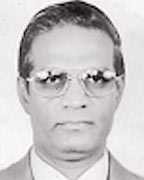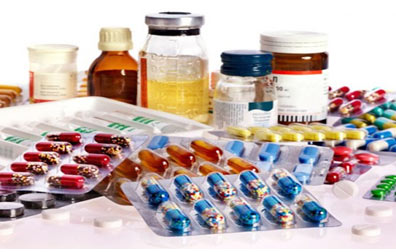THE PILL OVERLOAD
by Carol Aloysius
The population boom, followed by the surge in communicable and non
communicable diseases has resulted in a visible spike in medicinal drug
dependency in Sri Lanka.
With demand often exceeding supply, most patients find themselves
pushed to the wall when forced to fork out thousands of hard earned
rupees for a handful of drugs which may or may not cure them of their
complaints, depending on their quality and efficacy.
Still, it's a gamble they are willing to take- driven by their
conviction that drugs are the ultimate cure for all their illnesses..
According to a report by the Institute of Policy Studies in 2005, it
was reported that approximately 9,000 medicinal drugs are registered in
Sri Lanka. How essential they are is still a matter of conjecture.
Health Ministry sources on the other hand say the number is much less
for the government sector. Health Ministry sources said only 1,000 drugs
are registered in the hospital formula. Except for 52 drugs which are
manufactured locally, the balance is imported. In the case of the
private sector the exact extent of drugs imported is a matter of guess
work.
How much of these drugs meet the quality standards prescribed both
nationally and internationally, we asked?
COPE
An investigative report by the Committee on Public Enterprises (COPE)
this week disclosed some startling information regarding drugs imports.
The chairman of COPE, Sunil Handunetti in an interview with our sister
paper, the Daily News charged that Sri Lanka has imported rupees one
billion worth of sub standard drugs in the past five years. He further
accused the three institutions responsible for supply and distribution
of drugs to the state health care system of lacking proper communication
and coordination. He has also said the State Pharmaceutical Corporation
( SPC) did not have the mechanism to conduct checks and expiry dates on
medicinal drugs that arrive at the Customs, raising concerns about
quality assurance of imported drugs.
 |
 |
| Deputy
Director General, Medical Supplies Division, Dr Kamal Jayasinghe |
Managing
Director, State Pharmaceutical Manufacturing Corporation, P.
Suntharalingam |
Reacting to these charges, the Managing Director of the State
Pharmaceutical Manufacturing Corporation ( SPMC) P. Suntharalingam told
the Sunday Observer, " We only import raw material for medicinal drugs.
We strictly follow procurement guidelines, tender procedure and any
other requirement relating to the import of raw material. When there is
a need to import raw material, we first place an advertisement for bids.
Since they are imported, the tenderers are from all over the world. All
bids are open in the presence of the tenderers, and similarly based on
the tenders we have pre-bid meetings if clarification is sought for
transparency reasons. Next the matter goes before the Technical
Committee whose members are from different disciplines - a few from the
Corporation and from the Health Ministry. All members are appointed by
the Secretary of the Ministry of Health while in all our committees we
include a representative of the Health Ministry as well".
Commenting on the recommendation by COPE to devise mechanisms for
quality checks at the port of entry, Suntharalingam said "All raw
material imported for medicinal drugs, is subject to rigorous testing.
It is tested for quality before being given for production Thereafter,
each batch is tested after manufacture and only if we are hundred
percent satisfied, we release them for distribution to government health
facilities," he said.
Former Director Food and Drugs Authority , Dr Hemantha Herat said
14,000 items were on the list of medical supplies. They included
medicinal drugs as well as other items such as injectables and, surgical
gloves. Regarding drugs, he said the requirements for Sri Lanka being a
small country, was relatively, small. Hence the prices quoted would be
comparatively high."
Competitive bidding
 |
|
Pic: indianexpress.com |
He explained that in the case of certain drugs, only a very small
quantity was required. Sometimes the procedures involved in importing
those small quantities may exceed the total drug value and push up the
prices to even double the original amount. He said while it was cheaper
to import drugs in large stocks which then would also last a longer
time, for practical reasons this was not possible.
He said "Due to the high price of imported drugs, we are now going
for competitive bidding. Most suppliers are looking at basic standards.
If we want something more than that , they will raise their prices.
Although drug quality standards are being constantly revised,
competitive bidding on our side could lead to suppliers compromising
standards. The result would be sub standard drugs."
Because of this he said," We should support the SPC and National
Drugs quality Assurance laboratories, to ensure that all essential drugs
we import are up to the required standard."
Medical Supplies Division Deputy Director General Dr Kamal
Jayasinghe's emphatically denied the COPE charge that the country was
flooded with low quality imported drugs. "We have seen a remarkable
improvement in the quality of imported drugs and a much less frequency
in quality failure", he asserted.
The main cause for this miracle he said was the recently amended
rules and regulations which the Lankan government expected all suppliers
of imported drugs to adhere to.
Improvement
"Previously, whenever there was a quality failure in the drugs we
imported, only the balance stocks were withdrawn and the supplier had to
pay the cost of only the remaining stocks. Now that has changed with the
new rules. Hereafter, all suppliers of medical drugs have to pay for the
total consignment - plus a hefty 25% penalty tax i.e. 125% by way of
taxes, if there is quality failure. Since the SPC is the importing
agency, we charge the SPC, which in turn charges the suppliers, unless
it is due to shortcomings on our side such as poor storage. Hence there
is a improvement in the quality of the drugs we import," he said.
Computer network
He said the latest inputs into drug management via a computer network
facilitates rational distribution of drugs, cutting down
over-distribution and under- distribution of essential drugs. "The
computer system connects line ministry institutions and the Regional
Medicinal Supplies Division ( RMSD). We are in the process of extending
it to provincial institutes shortly, "he said.
How does this help in better drug distribution management, we asked?
"With this system in place, we can effectively monitor distribution
of drugs , minimise wastage. In the past two to five years, there have
been very few or no expired drugs being reported, as we are now in
control and can visualise from the centre," he said.
He noted that in the past they had to imagine and forecast estimates.
This was not an accurate method. We noticed supply gaps due to
under-estimation and wastage due to over estimation. Now with computers
in place, we can do realistic estmates according to actual consumption
patterns", he said.
President People's Movement for the Rights of Patients, Louis
Benedict, a long time campaigner for quality drugs at an affordable
price, said he was happy that the long delayed National Medicinal Drugs
Policy ( NMDP) advocated forty years ago by Professor Bibile was being
implemented at last, and that a quality drugs assurance lab was being
set up, with foreign technical assistance.
" With the number of essential drugs also being reduced, and an
upgraded quality lab in the offing, we hope things will change for the
better when it comes to obtaining good quality drugs at cheaper prices
for all of Lankans.
However, the authorities must keep a sharp lookout for counterfeit
drugs that are smuggled into the country in suitcases, and sold at
exorbitant prices even though they contain nothing more than plain
cornflour or wheat flour. 'Baggage drugs' have become big business and
manufactured in small cottages in neighbouring countries. The urgent
need now is to eliminate racketeers, get rid of unnecessary brands of
the same drugs and streamline drug distribution in this country".
As a solution to the present drug situation, health officials said
since drug usage has becoming a daily part of our lives, a rational
policy of drugs usage. should be adopted islandwide. "Both the
prescriber and supplying agencies should work together for rational drug
use in Sri Lanka ", Dr Jayasinghe said.
SPC officials and the COPE chairman were unavailable for comment at
the time of going to press, despite repeated attempts to contact them. |

